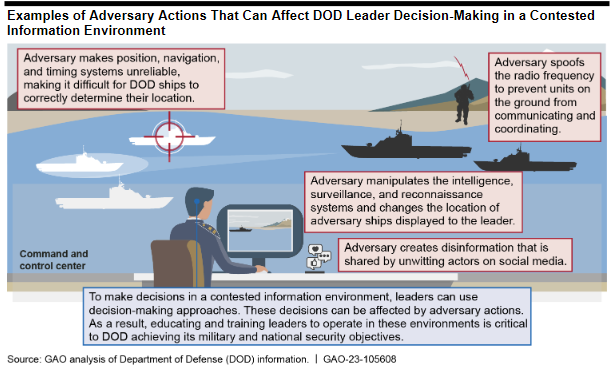JASPREET GILL

WASHINGTON — The Pentagon plans to develop department-wide guidance on what content it should include in its training and education efforts for decision-making in a “contested information environment,” following recommendations made by the Government Accountability Office.
The information environment, which a new GAO report released on Thursday [PDF] defines as “the aggregate of factors that affect how humans and automated systems derive meaning from, act upon, and are impacted by information,” isn’t limited by geographic boundaries, posing a risk for the US where adversaries, like Russia or China, can attack.
“For example, the widespread availability of wireless communications, expansion of information technology, dependence on the electromagnetic spectrum, and the far-reaching effect of social media to disseminate disinformation and influence decisions has led to the rapid evolution of the information environment,” according to the report. “These factors pose new and complex challenges for national security.”
Potential disruptions are described in a series of graphics in the report, including warning how adversaries could interfere with GPS signals, spoof radio frequencies or spread disinformation online.
 Despite the well-known risks, the GAO report says the Defense Department lacks resources and clarity about what to include when training leaders to make decisions in contested information environments. The GAO also found that current training efforts are inconsistent and do not require including the full spectrum of threats in a contest information environment.
Despite the well-known risks, the GAO report says the Defense Department lacks resources and clarity about what to include when training leaders to make decisions in contested information environments. The GAO also found that current training efforts are inconsistent and do not require including the full spectrum of threats in a contest information environment.Current DoD education guidance on the information environment is set to expire this year, according to the report. In May 2019, “globally integrated operations in the information environment” was identified as a “special area of emphasis” by the Chairman of the Joint Chiefs of Staff, but it didn’t specify “what aspects of the information environment should be covered in coursework,” according to the report.
“Furthermore, the designation of the information environment as a special area of emphasis is due to expire in 2023 when the Chairman of the Joint Chiefs of Staff’s memorandum expires and new special areas of emphasis are identified,” the report says. “As of July 2022, the final list of proposals for 2023 did not include the information environment as a special area of emphasis, and the proposals also did not focus on decision-making in this environment, according to a cognizant Joint Staff education official.”
In its report, the GAO focused on the military services, US European Command, US Indo-Pacific Command, US Special Operations Command and the National Defense University and conducted its audit from December 2021 to this month.
DoD partially agreed with the GAO’s first recommendation in the report, which called for the Secretary of Defense to ensure that the Chairman of the Joint Chiefs of Staff, combatant commands and military services develop department-wide guidance on what content to include in its contested information environment training and education efforts “as well as the type and frequency of those efforts necessary for leaders to develop skills in this area.”
“However, the frequency of ‘such efforts,’ particularly training efforts, must be based on operational tempo and determined at the Combatant Command level, it should not be dictated by the Secretary of Defense,” DoD wrote in a response to the GAO.
DoD fully agreed with the GAO’s second recommendation, which asked the Secretary of Defense to ensure the Chairman of the Joint Chiefs of Staff, the Undersecretary of Defense for Personnel Readiness, combatant commands and military services conduct an assessment and review “related component assessments of the resources necessary to meet current needs for educating and training leaders to make decisions in a contested information environment.”
“I think one of… the things we sought to accomplish in the course of the update is clarifying the language to ensure a common understanding both inside and outside the Pentagon of what the directive says,” said Michael Horowitz, director of the Pentagon’s Emerging Capabilities Policy Office.
“The assessment should also identify modifications, if any, needed to improve the results of future education and training efforts to increase the preparedness of DoD’s leaders to make such decisions,” according to the report.
No comments:
Post a Comment